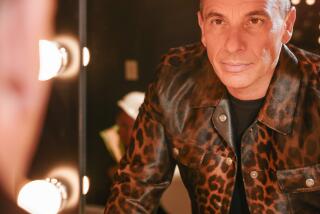FREE-AGENT STATUS SUITS EX-JOCK MARINARO FINE
- Share via
A good ball-carrier knows when to cut back and change direction, giving up yardage now in order to reach the open field. Former NFL halfback Ed Marinaro gave up his cushy job as a well-paid “Hill Street Blues” regular a year ago, and now he reports the result in line-score terms: “I’ve made more money on my own than if I’d stayed on salary.”
On his own, out of the mold of a supernumerary cop, Marinaro has starred in a film and two TV movies, made a deal to plug beer and will appear in four episodes of “Falcon Crest” next season. His best post-”Hill Street” part comes up later this year in a CBS movie, “Sharing Richard.” Marinaro plays a doctor whom three ladies are happy to share.
“I’m not the type of person you’d immediately think would be a doctor, but why not?” he asks. “Who is the doctor type, anyway? I was convincing playing a cop for five years. Does that make me a cop type or a good actor?”
Marinaro was trained in hotel management while he was breaking yardage records at Cornell in the early 1970s. After graduation, he says, “I thought about working in a hotel for about 20 minutes. Football took me in a different direction.”
In his injury-plagued career, Marinaro played in the pros for six years before leaving the game in 1978.
“Football gave me a taste of being in the limelight that I guess I’ll never get over. I could never see myself in an anonymous career where nobody knows you except your secretary. When you’re young and you taste that adulation, it becomes a disease.”
He got into acting because he saw Joe Namath succeeding in Hollywood on a smile and a handshake.
“When I first started out here nine years ago,” Marinaro recalls, “I thought I’d probably have my own series in about a month. I had the typical athlete’s attitude: Everything comes easy. Sure, you practice and you train, but most professional athletes are born with it. At the time of your life when you’re developing your values, things come easy. You begin to feel that things should be given to you. But it doesn’t work like that.”
Marinaro struggled. He got a couple of “gift” parts, two-line performances that helped him learn the addresses of the major studios in town. He studied hard and eventually got a running part on “Laverne & Shirley.” A guest shot on “Hill Street” developed into a steady job when his character, Officer Joe Coffey, miraculously recovered from a shotgun blast.
The problem on “Hill Street,” Marinaro says, was that “Everyone fell into a slot. There were certain characters that the show was centered around. The others got one or two story lines a season. I outgrew my part and I wanted to do more, but I couldn’t. It was hard to come to work and have nothing to do. It was boring. The only reason to stick around was the money, and I didn’t want to prolong the agony for that.
“Being a free agent is the right thing for me now. Thanks to ‘Hill Street,’ I’m in good shape. I bought a beautiful house . . . cars. . . . I lead a great life because of that show. I left because the returns were diminishing. I was missing the things I got into acting for.”
Adulation remains important to Marinaro. “You hear people say they don’t like all the attention because they do it for their art. I gag when I hear that. It makes me laugh. I’m as serious about my work as anyone, but that doesn’t mean I have to be temperamental and antisocial.”
Engaging and quick to smile, Marinaro, the son of a New Jersey sign painter, is as candid about money as he is about liking attention: “I want to make as much money as I can. I’m not independently wealthy. I’ve got to be honest. I like doing plays, for instance--I’ve done two. But you can’t turn down a lot of money to work in the theater for $500 a week.
“It’s not that an actor will do anything for the money. You want to make enough money so acting can be fun again--so you can hold out for the good parts. You hear actors say, ‘I’d like to work hard for five years and make enough money so I’ll never have to work again.’ What they mean is, they want enough money so they’ll never have to work again playing parts they don’t want to play.”
For a TV actor like Marinaro, getting into feature films remains a distant goal. The one he has done, “Mace,” put him back in a cop’s uniform.
“I go up occasionally for features,” Marinaro says. He adds with characteristic forthrightness, “Those people are such snobs. They look down at people who work in TV. They’ve done TV! All of a sudden they’re no longer mortal because they do films now? They’ve got more talent now? Does it sound like I’m bitter? I know it’s mostly luck, and if I hang around long enough I’ll get my shot.
“As you get older and your self-esteem gets in the right place, you start to do more things for the right reasons.
“I thought for a while that the world owed me a favor. I figured everything would happen in a week. Now I know it takes longer. What counts is how long you hang in there.”
More to Read
Go beyond the scoreboard
Get the latest on L.A.'s teams in the daily Sports Report newsletter.
You may occasionally receive promotional content from the Los Angeles Times.










